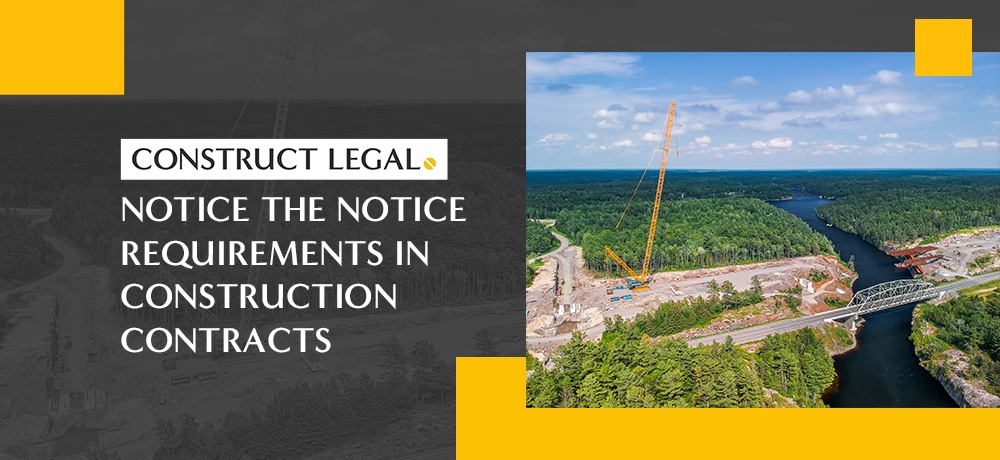Notice the Notice Requirements in Construction Contracts

Notice requirements in Ontario-based construction contracts are strictly interpreted by the courts. With few exceptions, a failure to strictly comply with a notice requirement can be used as a complete bar to otherwise valid claims for costs or time. Because of this, it is essential that parties to construction contracts take the time to assess what their notice obligations are before a dispute arises.
What to Look for in a Notice Provision
Many construction contracts use strict notice timelines, sometimes as short as a few days. In addition to a prescribed timeline for giving notice, most notice requirements will also contain both procedural and substantive requirements. This means you should look for three main things when evaluating the notice provisions in your construction contracts:
- the deadline to give notice;
- the procedural requirements for giving notice; and
- the substantive information your notice needs to provide.
There are only very limited exceptions to the strict requirements to give notice. It is best to treat notice requirements as absolute and to always ensure compliance with them.
Deadlines to Give Notice are Strictly Enforced
The deadline to give notice is a critical part of any notice provision. If a party fails to give notice within the contractually prescribed deadline, it is difficult for that party to bring a successful claim for costs or time for the issues they did not provide timely notice for. Some notice provisions will identify a specific number of days for giving notice, while some require notice within a reasonable amount of time. In either case, it is important to understand the triggering event for the relevant deadline. Some contracts will identify the triggering event for the notice period as an event which can potentially give rise to a claim for costs or delays. In other contracts, the time to give notice may not start to run until you are aware that damages or delays have resulted from an event. In either case, it is important to be clear on both what the notice period is and when that notice period starts to run.
How to Give Notice
Many contracts will also require notices to be given in a specific form or delivered in a certain way. Parties should read their contracts closely to determine the proper format for giving notice well in advance of the need to actually give a notice. For example, in some contracts, email is not an accepted method of delivering notice. This means that even if your day-to-day site correspondence is conducted via email, you will need to understand and follow the proper procedure for delivering a contractual notice, be that mail, hand delivery, or some other method of delivery. Some contracts will also deem notices delivered in a certain manner to be received on a later date than when they were actually sent. These timelines must be factored into any deadlines to give notice.
What to Include in a Notice
Finally, notice provisions will often establish the substantive requirements for giving notice. Under some contracts, it will be enough to provide a description of the events and estimates of the costs incurred or time lost. In other cases, giving proper notice may require providing an assessment of how the critical path of the project has been impacted by the events related to the claim.
As with all elements of a notice provision, the specific requirements will differ from contract to contract, often significantly so. It is not enough to assume that you are safe on a new project by using your standard means and methods of giving notice. The language of each contract will govern and the specific rules created by each contract need to be followed to give you the best chance of preserving your claims.
This article is not legal advice and is provided for informational purposes only